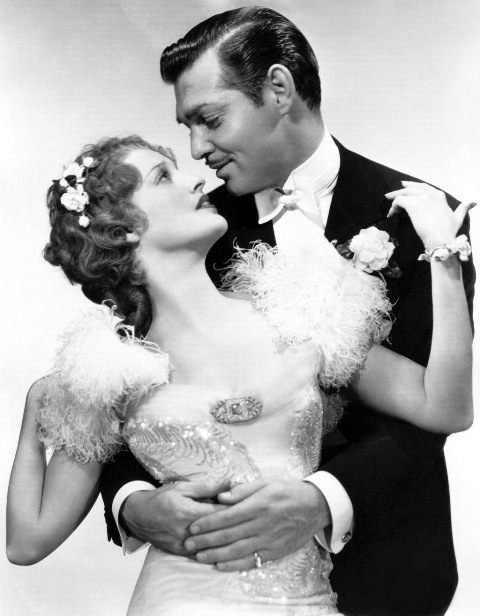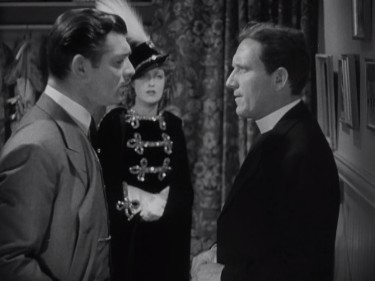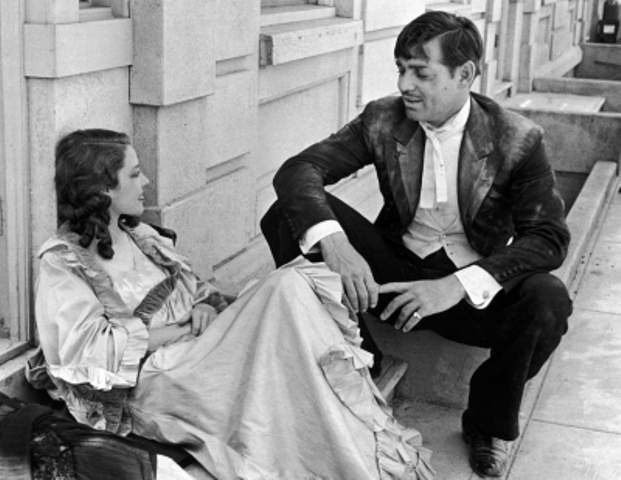San Francisco (1936)

Release Date: June 26, 1936
Directed by: W.S. Van Dyke
Studio: MGM
Costarring:
Jeanette MacDonald
Spencer Tracy
Available on DVD through The Clark Gable Signature Collection
DearMrGable.com’s Movie of the Month, August 2014
Nutshell Review, February 2014
10th Anniversary Celebration Movie of the Week, December 31, 2018
Gable is Blackie Norton, a ruthless saloon-keeper in 1906 San Francisco, proud of his gambling ways. Despite their differences, he falls in love with Mary Blake (MacDonald), an aspiring opera singer who he hires to sing in his revue. His childhood pal, priest Tim Mullin (Tracy), objects to him putting Mary on display and stopping her from her opera aspirations. Realizing that Tim is right and that she should pursue her dreams instead of letting Blackie hold her back, Mary leaves him and becomes a successful opera star. It isn’t until the shattering earthquake that Blackie realizes his true feelings for Mary and sets out to find her among the rubble.
Reviews
Photoplay magazine, October 1936:
Out of a story of a tough Barbary Coast café owner, a beautiful singer and a priest, W.S. van Dyke has constructed an epic. Clark Gable superb; Jeanette MacDonald’s lovely voice allowed full range, and the earthquake sequence will knock you out of your seat. You must see it.
Fan letter, Photoplay magazine, November 1936:
The lights were dimmed–the curtains swung apart–suddenly my boredom a-dashing-went! A strange magnetism in the vivid introductory scenes compelled me to actually live the whole gripping story of “San Francisco”. I saw it three times and yet not a single reel lost its realistic reel lost its realistic thrill. It implanted an utterly new and indomitable foundation in my spirit. A foundation that included elements of holy mediation, courageous vitality, uplifting inspiration and purposeful ambitions. Modern movies rarely arouse these powerful emotions; perhaps that is the secret of “San Francisco’s” electrifying force.
~Mary E. Souders, Nashville, Indiana

Quote-able Gable
“Hello, Happy New Year!” first line
“Good night, sucker!”
“And now, free beer on me!”
“I’m a sucker if I’ve ever known a girl like you before.”
“You know I like looking into those big lamps of yours.”
“I’m crazy about you kid, you know it, don’t you, honey.”
“How does it feel to feel like a woman and be afraid of it?”
“God? Isn’t he supposed to be taking care of the suckers that come out of the missions looking for something to eat and some place to sleep? I’ve seen them down on their knees asking for things they should stand up and fight for. I don’t see God coming down and giving the suckers a shortcut. That’s not what I want. I want to push over the mugs that stand in my way before they push me over. What I believe in is not up in the air; it’s in here (points to his head) and here (points to his heart). Maybe that’s not right. Maybe it’s not right to feel alive, like you and I do this minute. But I think it’s right.”
“You know, I never tried to kid you, Mary. You take me as I am or you don’t take me. Tim doesn’t try to change me because he knows he can’t. And you can’t either. Nothing can. You know what I’ve been waiting for? I’ve been waiting to hear you say that I’m alright with you the way I am. Maybe you’re ready to say it now. Are you?”
“Who am I to hold out against these three thousand mugs who went goofy over you?”
“Wait a minute. You leave now and you’re never coming back!”
“Tim, I want to thank God. What do I say?”
“Thanks, God, thanks. I really mean it.” last line
Behind the Scenes
Production started on February 17, 1936. It took fifty two days to shoot and costs $1.3 million.
Gable’s romance with Carole Lombard began right before he started filming. She began work on her film The Princess Comes Across.The film’s theme song, by composers Walter Jurmann and Bronislau Kaper and lyricist Gus Kahn, became very popular and is still today considered to be the theme song of the city of San Francisco.
Jeannette MacDonald was one of Gable’s least favorite lady costars. He considered her to be prissy and fake. He objected to starring in the film with her because he felt he would look stupid just sitting there listening to her sing. He also was perturbed by how long it took her in her dressing room and that her contract stipulated that she get a week off every month for her menstrual period.
Gable purposely ate spaghetti loaded with garlic before his first kissing scene with MacDonald. His breath was so bad that she nearly fainted.
Gable and Spencer Tracy spent their time between takes playing cards and drinking together.
One of MacDonald’s opera gowns was later re-used as a gown for Gilda in The Wizard of Oz (1939).
D.W. Griffith was hired to direct the earthquake scenes after the producers saw the rushes of Van Dyke’s version, which they thought were rushed and fake-looking. Griffith gave them the authenticity they needed. His only direction to the mobs of extras was, “Pretend it’s an earthquake! Run for your lives! Try to help your friends!”
The stunning special effects used to simulate the earthquake were created by hydraulic platforms that were pulled apart by cables with hoses underneath.
Gable objected to his final scene where he falls to his knees and prays, considering it unmanly and cowardly. Van Dyke compromised with him by only filming him from behind.
After filming was completed, Gable was called back to the set to do a retake on a scene. He had already started production on his next project, Cain and Mabel, and had shaved off his mustache for the role. He had to wear a fake one for the retake.
The film was one of the biggest hits of 1936, earning $5.3 million and a profit of $2.2 million. It became Gable’s highest grossing film after Gone with the Wind.
Won the Academy Award for Best Sound Recording. Also nominated for Best Picture, Best Director, Best Assistant Director, Best Writing (Original Story), and Best Actor Spencer Tracy. Gable was bitter about Tracy’s nomination, especially since his role was more of a supporting part.